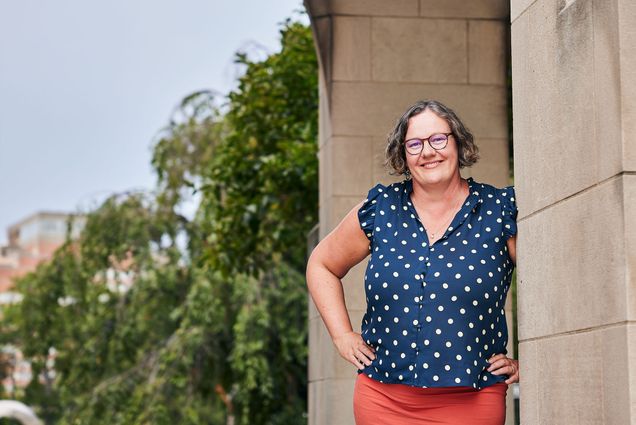Environmental Ecologist Lucy Hutyra Wins a 2023 MacArthur “Genius Grant”

By Maureen Stanton, Hariri Institute for Computing
Lucy Hutyra, CAS Professor of Earth and Environment and Hariri Institute Core Faculty, was named a 2023 MacArthur Fellow—one of the most prestigious awards to individuals pursuing a range of intellectual and creative interests with global perspective. She is one of 20 fellows to receive the award, commonly known as the “genius grant.” The award provides $800,000 in “no strings-attached” funding over five years to advance intellectual pursuits.
“The prize is financial, but it’s also access and being part of a community of extraordinary thinkers and doers,” says Marlies Carruth, Director of the MacArthur Fellows. The foundation reviews nominations for fellows over a yearslong process that solicits input from their communities and peers. Fellows do not apply and are never officially informed that they’ve been nominated unless they are selected for the award.
Hutyra is an environmental ecologist whose research interests include interactions between humans and ecosystems spanning (1) carbon and water cycling (2) ecosystem responses to stressors (both human and climatic); (3) Atmosphere–biosphere interactions; (4) terrestrial ecology; (5) urban ecology. Her research uses principles from a number of different scientific fields to understand the terrestrial carbon cycle and the impact of humans on carbon pools and fluxes.
The MacArthur Foundation recognized Hutyra’s work in investigating the impacts of urbanization on environmental carbon cycle dynamics. On its website announcing her fellowship, the foundation wrote,”Understanding the amount of carbon exchanged between the atmosphere and biosphere is critical to determining the effectiveness of carbon emission reduction and climate change mitigation strategies… Hutyra’s findings indicate that conservation of urban forest fragments has multiple mitigation effects on local climate change impacts… Hutyra has also created models to measure the cooling benefits of tree canopies, green roofs, and white roofs in different climate conditions. Hutyra expands understanding of carbon cycle variability in urban ecosystems, and her work will be critical to climate mitigation efforts that are increasingly localized as urbanization continues apace.”
The Brink, in one of its most-read 2022 science stories, elucidated on her discoveries, published in a series of papers, that shows trees in the city are more productive. Her research has demonstrated that urban trees grow faster, store more carbon dioxide, and release more water into the atmosphere than rural areas.
Hutyra’s research also focuses on studying whether and how the policies that cities and states are putting forth for reducing greenhouse gas emissions are working. “I’m very passionate about doing science that makes a difference,” says Hutrya. “Over 70% of greenhouse gas emissions are concentrated in cities, so the policies that are enacted in cities make a huge difference to our atmospheric greenhouse gas burden.”
Hutyra is recognized for her ability to catalyze large cross-disciplinary collaborations. At Hariri Institute, Hutyra is co-leading the 2024 Focused Research Program “Health Equity in the Wake of Continued Climate Change: Leveraging Big Data to Inform Action,” which will provide the BU climate and health research community access to shared resources to accelerate research, innovation, and translation in this area.
“Cities are grappling with the intertwined challenges of climate change and sustainable development,” says Hutrya. “The choices we make about where people live, the infrastructure we construct, and the ecosystems we choose to preserve have far-reaching consequences. We already know many of the solutions; the real challenge before us is implementing place-based solutions that produce thriving, just, and equitable societies.”
Hutyra is also Director of the BU Biogeoscience Program, and Associate Director of the BU URBAN Program, which prepares PhD students to address urban environmental challenges using interdisciplinary methods. This academic year, she is a visiting faculty researcher at Google.
Hutyra has published in a variety of scientific journals, including Proceedings of the National Academy of Sciences, Nature, Journal of Geophysical Research, Global Change Biology, and Science of the Total Environment, among others. Learn more about her research here.